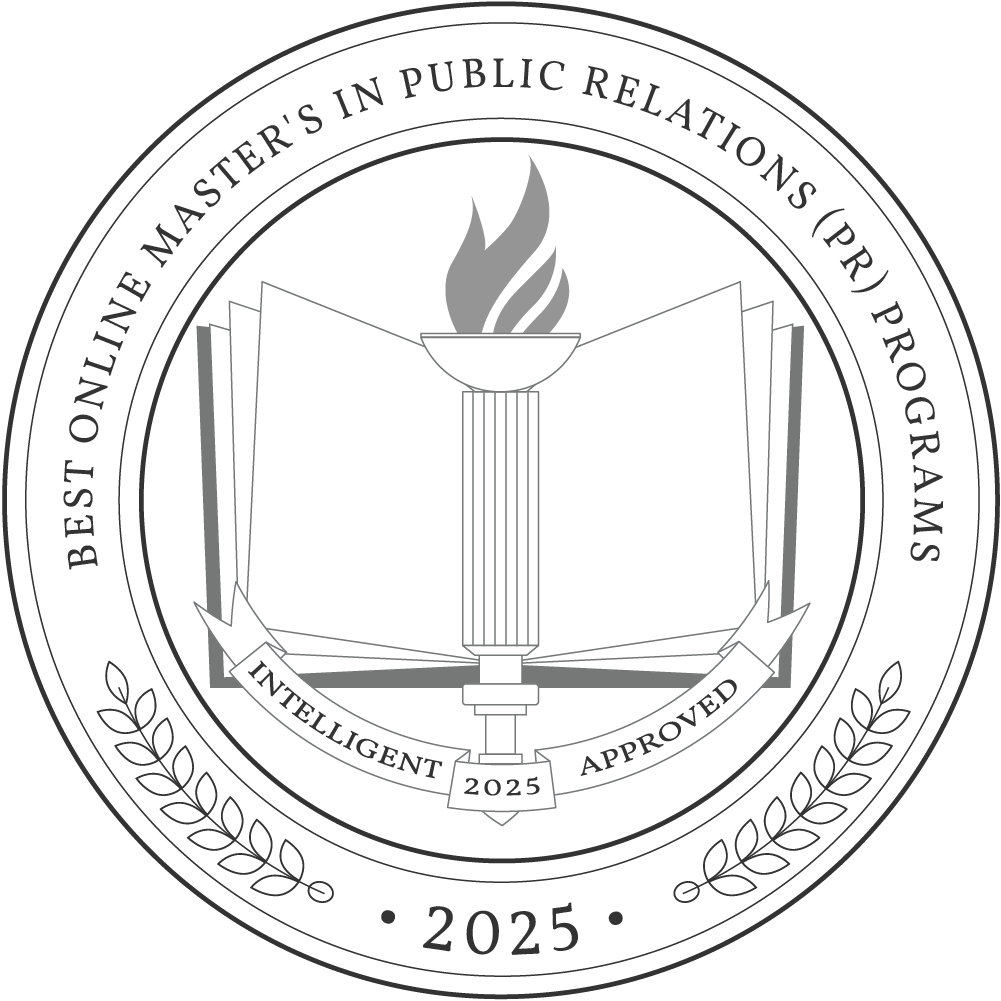A master’s in public relations is for aspiring communications experts. These programs help individuals master the various technologies and strategies necessary to become successful public relations professionals. Participants engage in media analysis, targeted customer branding, and writing exercises, ultimately developing the communications expertise required for corporate, nonprofit, and government employers.
Online students can find part-time or full-time degree options. A master’s degree in public relations requires 30-36 credit hours; full-time attendees will generally need four semesters to graduate.
Successful graduates will qualify for senior-level or managerial positions in the public relations field. Career options include media director, senior public relations strategist, or communications specialist.
We spoke with Michelle Pickett, director of Northern Illinois University’s Academic Advising Center, for her expert advice on selecting an online master’s program in public relations, creating a standout application, and exploring potential career paths after graduation.
Why Trust Us
The Intelligent.com Higher Education Team is dedicated to providing students with independent, equitable school and program rankings and well-researched resources. Our expert-driven articles cover topics related to online colleges and programs, paying for school, and career outlooks. We use data from the U.S. Department of Education’s College Scorecard, the National Center for Education Statistics, and other reputable educational and professional organizations. Our academic advisory team reviews content and verifies accuracy throughout the year for the most current information. Partnerships do not influence rankings or editorial decisions.
- Analyzed over 2,000 national, accredited, and nonprofit colleges and universities
- 800+ rankings pages are reviewed and updated yearly
- Content is informed by reputable sources, surveys, and interviews with academic advisors and other experts
- Over 100 data points are reviewed for accuracy and quality throughout the year, including sources
How we rank schools
Our list features the best online Public Relations (PR) degree programs at top colleges nationwide. Each school featured is a nonprofit, accredited institution — either public or private — with a high standard of academic quality for post-secondary institutions.
We evaluated each school’s program on tuition costs, admission, retention and graduation rates, faculty, reputation, and the student resources provided for online students. We collected data from trusted sources like the National Center for Education Statistics, individual school and program websites, school admissions counselors, and other data sources. Then, we calculated the Intelligent Score on a scale of 0 to 100 based on the following criterion:
Academic Quality:
- Admission rate versus enrollment rate
- Retention rate of students who return after year one
- Accreditation status (regional and programmatic)
- Nonprofit status, both private and public institutions
Graduation Rate
- Overall graduation rate
- Total number of currently enrolled students, including diversity metrics
- Student-to-faculty ratio
Cost and ROI
- In-state and out-of-state per-credit tuition rates and fees
- Required credits to graduate
- Earning potential after graduation
- Availability of federal student loans, scholarships, and other financial aid options
Student Resources
- Available student services for online-only and hybrid programs
- On-campus amenities like tutoring centers and the number of libraries
Read more about our ranking methodology.
Best 6 Accredited Online Master’s in Public Relations Programs
FiltersInstitution Type
Status
- Intelligent Score
- Alphabetically By University Name
- Acceptance Rate
- Enrollment
- In-state Graduate Tuition
- Out-of-state Graduate Tuition
- In-state Undergraduate Tuition
- Out-of-state Undergraduate Tuition

University of Southern California
Intelligent Score: 97.3In-state: $59,260
Out-of-state: $59,260
In-state: $47,880
Out-of-state: $47,880
SAT: 1340-1530
ACT: 30-34
$2,354
Online
Western Association of Schools and Colleges Senior College and University Commission
24

George Washington University
Intelligent Score: 94.67In-state: $55,961
Out-of-state: $55,961
In-state: $31,770
Out-of-state: $31,770
SAT: 1270-1450
ACT: 30-33
$1,880
Online, On-Campus, Hybrid
Middle States Commission on Higher Education
30

Georgetown University
Intelligent Score: 93.69In-state: $57,384
Out-of-state: $57,384
In-state: $53,136
Out-of-state: $53,136
SAT: 1380-1550
ACT: 31-35
$1,620
Online, On-Campus
Middle States Commission on Higher Education
30

Quinnipiac University
Intelligent Score: 91.11In-state: $48,200
Out-of-state: $48,200
In-state: $19,350
Out-of-state: $19,350
SAT: N/A
ACT: N/A
$1,035
Online, On-Campus
New England Commission of Higher Education
30

Ball State University
Intelligent Score: 90.13In-state: $9,482
Out-of-state: $26,470
In-state: $9,328
Out-of-state: $9,328
SAT: N/A
ACT: N/A
In-State: $464
Out-of-State: $696
Online
Higher Learning Commission
30-33

Montana State University Billings
Intelligent Score: 90.04In-state: $18,206
Out-of-state: $32,847
In-state: $24,250
Out-of-state: $24,250
SAT: 940-1160
ACT: 17-23
Resdient: $267
Non-Resident: $275
Online
Northwest Commission on Colleges and Universities
30
How to Choose an Online Master’s in Public Relations Program
Choose your area of study
Public relations graduate degrees often fall within the purview of a school’s communications or business department; you might sometimes see degrees listed as a Master of Arts in Communications with a concentration in public relations. Whether it’s offered as a standalone degree or a concentration, master’s in public relations programs are typically offered in either a Master of Arts (MA) or Master of Science (MS) format.
Within each degree program, you may be able to choose a specific area to focus your studies. Consider your long-term professional interests and career goals, and research whether an institution’s master’s program offers related coursework and electives. For example, some programs emphasize corporate communication strategies, whereas others may instead focus on digital branding.
“Researching the growth opportunities for a career is important,” says Pickett. “It helps individuals understand the full scope and opportunities for an area they are interested in pursuing.”
Research schools and programs
You should only consider institutions that have been approved by a DOE-recognized regional accrediting organization, such as the New England Commission of Higher Education or Northwest Commission on Colleges and Universities. These organizations evaluate schools to ensure they provide students with a high-quality education. Those who attend a school that isn’t regionally accredited may be unable to access financial aid or transfer credits to another institution if needed.
Ideally, your master’s in public relations program will also be accredited by a respected industry group like the Association for the Advancement of Collegiate Schools of Business (AACSB). This programmatic accrediting organization has particularly high standards for business education.
After narrowing down those properly accredited programs whose coursework best aligns with your interests, consider other aspects of each program:
- Is there a thesis or final project required to graduate? Most public relations degrees mandate a three-credit comprehensive capstone project. In this course, you can apply your skills to a real-world public relations problem, giving you valuable professional experience.
- Are you eligible for the program? Some degree programs only accept students with prior professional experience or a minimum undergraduate GPA. Confirm that your background meets eligibility for the program.
- Will this program lead to professional credentials? Some public relations degree programs specifically prepare students for professional certification in the field, such as the Accreditation for Public Relations. These extra qualifications can give you an edge in your job search.
To learn more about any schools that you’re interested in, you can visit the school’s website, contact an admissions counselor, follow the school on social media, or attend an in-person or virtual open house.
Prepare for tests and applications
Application requirements vary by school and program. Look out for application deadlines and prepare your materials well ahead of them. Application materials can take some time to request and organize, especially undergraduate transcripts and letters of recommendation. You may need to write an essay or personal statement as well. “In your personal statement, address why you’re interested in the institution and your selected area of study, and discuss your personal or professional goals for the future,” Pickett suggests. “A personal statement can also allow students who may not meet all admissions criteria to provide details about their circumstances.”
Online graduate programs in public relations don’t often require standardized test scores, so you can typically skip the GRE. Interested international candidates may have additional testing and other obligations for their student visas.
Before submitting an application, always contact an admissions counselor to ensure you have the most accurate information regarding requirements and deadlines.
Select your program
Learn as much as you can about the programs. See if you can try a sample course. Attend orientations. Speak with a faculty member. Get a good sense of the online experience and network to help you select the best program for your professional and academic needs. From there, consider which program has the more affordable tuition package.
Before making your final decision, review your needs and goals again. Do you plan to attend school full-time or part-time? Are you only interested in 100% online programs, or are you fine with a hybrid program that has a few in-person requirements? Some programs offer asynchronous courses, which can be completed at your own pace, while others only offer synchronous courses, which involve remotely attending lectures and completing assignments at the same time as other students — which of these two online learning formats do you prefer? Your school should accommodate your scheduling needs and learning preferences.
Determine how you’ll pay for your degree
Don’t settle for the initial sticker price; master’s-level students still qualify for financial aid, grants, and scholarships. Fill out the FAFSA and speak with a financial aid counselor to determine any funding opportunities for which you might be eligible. Some schools even offer credit for related work experience. And if you do work in the field, you should see if your employer offers tuition assistance benefits as well.
What Can You Expect from an Online Master’s in Public Relations Program?
An online master’s in public relations empowers students to develop strategic responses to modern-day communication challenges. Participants learn how to craft a compelling speech, create a persuasive marketing strategy, and navigate digital media tools. Successful students will then apply that knowledge to a real-world context, whether through a comprehensive capstone project or thesis. Graduates will possess the knowledge and skills needed for advanced positions in the field.
If attending full-time, the online coursework takes two years; part-time students will likely need three to five years. While classes are remote, some master’s programs require a brief in-person residency during which students build a valuable peer and faculty network.
Potential courses you’ll take in an online master’s in public relations program
- Digital Communications Strategy. Students learn how digital communications integrate with traditional public relations strategy and ways to apply them to a real-world campaign or brand.
- Media Relations. Participants will learn the ins and outs of the news cycle and its stakeholders. Students study multimedia sources and public opinion, developing a deeper understanding of how to leverage these resources as assets for a company.
- Research Methods for PR. This class prepares students for secondary and primary research and how to use that knowledge to make informed public relations decisions. Participants will practice simulated real-world examples, including mock focus groups and surveys.
- Ethics in Mass Communications. Participants debate the morality of certain communications issues and critique modern-day media strategies. Students discuss moral and ethical philosophy and how it applies to the media.
What Can You Do With an Online Master’s in Public Relations?
Career outlook
A master’s degree in public relations equips individuals with the strategic skills and expertise needed to navigate complex media environments, shape public perception, and drive impactful communication campaigns. From managing brand reputation to crisis communication and media relations, opportunities are available in a broad range of areas for those who earn this degree.
As businesses and organizations recognize the importance of effective communication in the digital age, the demand for skilled public relations professionals continues to rise. Indeed, an online master’s degree in public relations opens doors to a variety of dynamic and influential career paths. Here are some potential avenues to consider:
- Public relations or fundraising manager — Public relations managers direct the creation of materials that will enhance the image of their clients, while fundraising managers write grants and direct other efforts to raise money.
- Median annual salary: $125,620
- Projected employment growth (through 2032): 6%
- New job openings projected: 7,800 annually
- Advertising, promotions, or marketing manager — Conduct market research, plan advertising and promotional campaigns, and supervise marketing staff.
- Median annual salary: $138,730
- Projected employment growth (through 2032): 6%
- New job openings projected: 34,000 annually
- Public relations specialist — Evaluate public opinion, respond to media requests, and write press releases and other materials on behalf of clients.
- Median annual salary: $67,440
- Projected employment growth (through 2032): 6%
- New job openings projected: 25,800 annually
Online Master’s in Public Relations Degree Frequently Asked Questions
How do I apply to an online master’s in public relations degree program?
A typical online master’s in public relations application packet includes the following:
- Undergraduate transcripts (many schools set a minimum bachelor’s GPA to qualify)
- A resume
- Letters of recommendation
- A writing sample
- A personal statement
- A completed graduate school application form
- An application fee
Should you have any questions about the process, speak with an admissions counselor.
How much does an online master’s in public relations degree cost?
According to the National Center for Education Statistics, the average cost of graduate school tuition is $20,513. Private schools tend to be more expensive than public schools. Also, public schools typically charge out-of-state students much higher tuition rates than in-state students.
Some online programs charge the same tuition rate, regardless of residency, and many add supplemental fees for remote classes. To reduce your overall financial commitment, speak to an admissions counselor or academic advisor about relevant transfer credits, especially if you have professional public relations experience. To calculate your total cost, consider books, computer equipment, travel costs (for any in-person requirements), and other personal expenses you may make to succeed in the program.
How long does it take to earn an online master’s in public relations degree?
Online public relations programs are typically available as full-time or part-time options. Students must complete 30 to 36 credit hours to graduate, including a three-credit comprehensive project. Full-time students can graduate within two years; those working in the field may be able to receive credit for their professional experience and therefore graduate a semester sooner. Part-time students typically graduate in three to five years, depending on their course load.
Is an online master's in public relations worth it?
An online master’s in public relations can be worth it if you are looking for a rewarding and impactful career in the communications sector. When you graduate, you will have gained specialized knowledge, strategic thinking, and practical skills that are highly sought after in the field of communication.
One of the key benefits of earning a master’s in public relations is the potential for increased earning potential. Graduates with this degree often qualify for higher-paying positions, particularly in leadership roles that require expertise in strategic communication and reputation management.
Online master’s programs in public relations offer a high level of flexibility, allowing you to balance your studies with work or other commitments. Virtual learning platforms give you access to case studies, simulations, and interactive discussions, enabling you to enhance your skills and knowledge from anywhere. “Students considering enrolling in an online college should ensure that they’re focused and motivated and can practice good time management and self-discipline skills, especially for self-paced programs,” says Pickett.
Additionally, the networking opportunities provided by an online master’s program are invaluable. You’ll have the chance to connect with fellow students, faculty, and professionals in the field, expanding your professional network and potentially leading to job opportunities, collaborations, and mentorship.
Read More about Online Master’s in Public Relations (PR) Degrees
Compare School Options
Related Degrees
- Sustainability
- Nonprofit Management
- Public Relations
- Hospitality Management
- Internet Marketing
- International Business
- Business Law
- Economics
- Business Management
- Hotel and Restaurant Management


